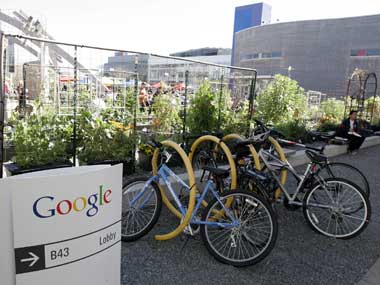In case you needed another sign that it’s boom time in Silicon Valley, real estate developers are racing to build new office space in anticipation of growing demand from tech companies.
“We’re seeing a white-hot market in Sunnyvale, Mountain View,” Sean Toomey of Colliers International, a commercial real estate firm, told the San Jose Mercury News .
This doesn’t even take into account expansions by Facebook , which will move into a shuttered Sun Microsystems campus in Menlo Park later this yearwhile maintaining its current Palo Alto office. And Apple’s space-age design for a new headquarters in Cupertino, which CEO Steve Jobs has been dreaming of for nearly three decades ,will begin construction in the next few years.
[caption id=“attachment_38267” align=“alignleft” width=“380” caption=“Comfort at work. Erin Siegal/Reuters”]
 [/caption]
[/caption]
Googleplex II hits a snag
Google’s riding the office expansion bandwagon, too. It’s real estate development arm, Planetary Ventures, is scheduled to begin construction in 2013 on a 42 acre space it has rented from NASA Ames Research Center in Mountain View. Located a stone’s throw from the Googleplex, the new campus will feature 1.2 million square feet of office space, recreational facilities, child care, and a cafeteria.
But the tech company hit a bit of a snag this week when Mountain View officials lambasted the search company at a public meeting over a pair of private bridges over the Stevens Creek Trail, a popular hiking path, that it wants to build to serve the new campus.
Google’s proposed one-lane bridges were designed to allow its network of employee shuttles an easy route for transporting employees to the new office. It will also have room for bikers and pedestrians.
A Google spokesman said at Tuesday’s public meeting, “The purpose of the Steven’s Creek Trail project is to both increase connectivity in the North Bayshore area as well as access and mobility for pedestrians, bicyclist, emergency shuttle vehicles and public transit. We believe this project will benefit the city of Mountain View by increasing transportation in the area.”
Impact Shorts
More ShortsThe development will generate about $700,000 a year in revenue for the city once it is developed.
‘Extremely negative’ feelings
But according to Mountain View officials, the bridges could disrupt the use of the hiking trail. It will also be built on an upper wetland area. “This is a very clear step away from protecting the environment,” Council Member Ronit Bryant said at the meeting. “This is, in the name of public transit, just adding a lot of cars on the trail where we haven’t had them before. My gut feeling is extremely negative on this.”
Mountain View Mayor Mayor Jac Siegel added that his “priority Nos. 1, 2, 3, 4 and 5 is the trail.”
“What are we going to do, we’re going to say, ‘Oh, because we’re going to get some revenue … that we’re going to let you go ahead and do things with our trail that we fought for 20 years to get to this point?’ " he asked. “I’ve got some real issues.”
An environmental group, Friends of Stevens Creek Trail, is generally supportive of the plan, which could reduce traffic to the area and increase use of the trail.
The city council also did not look kindly on the idea of privatising the bridges. “I don’t think it is of any benefit to Mountain View,” Councilwoman Bryant added. “I don’t see anything particularly convenient about it for us. I hate private streets. I can’t imagine a private bridge.”
But there’s plenty of time for everyone to hash out their differences. Local officials will help lead the environmental review of the project, and those documents could be released by October .
)